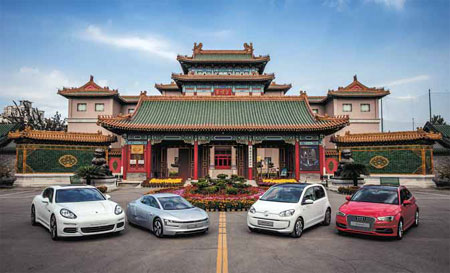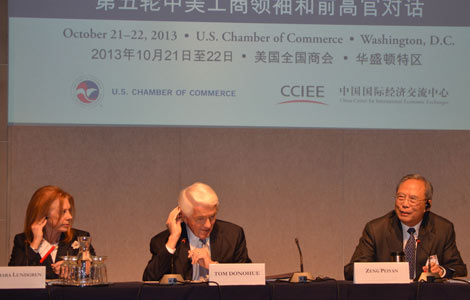Auto Special: Volkswagen Group starts new-energy vehicle offensive in China
Updated: 2013-10-25 07:02
By Zhao Shijun (China Daily USA)
|
|||||||||
Volkswagen China's technical experts shared the auto group's new-energy vehicle strategy with guests on Oct 23 in Beijing.
On display were the Volkswagen XL1 and Volkswagen electric up! as well as the Audi A3 e-tron and Porsche Panamera S E-Hybrid that demonstrate the full portfolio of the Volkswagen Group's new-energy vehicles.
"Volkswagen Group is committed to implementing a tailor-made strategy in China and bringing new-energy vehicles to meet local consumer needs in all segments and classes," said Jochem Heizmann, management board member of Volkswagen AG and president & CEO of Volkswagen Group China.
"The group's overall priority is on the plug-in hybrid as it combines the best of two worlds - pure electric driving in urban areas and long-distance driving with an efficient combustion engine."
Volkswagen Group has started localization of new-energy vehicle technology and will produce a range of the vehicles in China from 2016 when charging infrastructure is widely available, according to Heizmann.
Over the past decades, it has been always the strategy of Volkswagen Group to reduce fuel consumption and CO2 emissions. The engineers have continuously worked on innovative technologies to increase fuel efficiency. The group has lived up to its responsibility and has introduced the TSI, TDI, TFSI, Blue Motion, Greenline and hybrid to China.
With the Porsche Panamera plug-in hybrid Volkswagen Group is already offering Chinese customers new-energy vehicles and will further increase its portfolio step-by-step with the best customized and flexible solutions.
Volkswagen Group has already started localization of the new-energy technology and will be ready for volume production at its joint ventures from 2016 when charging infrastructure is widely available.
Volkswagen Group takes the most comprehensive approach to tomorrow's mobility across brands and segments.
Efficient hybrid
The Volkswagen XL1 is the most efficient diesel plug-in hybrid production car in the world with a fuel consumption of 0.9 L/100 km.
The XL1 follows pure sports car design principles - low weight due to carbon-fiber-reinforced polymer and other lightweight materials, top aerodynamics and a low center of gravity. It changed the traditional concept of production cars and shows the extraordinary charm of a cutting-edge design.
The four-seat pure electric up! produces a top power of 60kW, enabling it to sprint from zero to 100 km/h in 12.4 seconds and reach a top speed of 130 km/h. The 11.7 kwh/100km energy consumption for the electric up! is measured in the New European Driving Cycle or NEDC. It can drive up to 160 km on one charge.
Shaping the transition
The Audi brand is also shaping the transition to electric mobility.
With the Audi Q5 hybrid quattro, A6 hybrid and A8L hybrid, the brand already offers a broad range of hybrid cars to its customers in China.
Audi will also bring its e-tron technology to China in the near future.
The advanced plug-in hybrid technology of the Audi A3 e-tron combines impressive efficiency with unrestricted everyday utility and sporty power. It will be followed by additional plug-in hybrid models like the A3 Sportback e-tron that offers 150 kW of power and has average consumption of only 1.5 liters per 100 km of gasoline.
In electric mode, the A3 e-tron's operating range is up to 50 km, with the TFSI engine adding a further 890 km.
Audi will cooperate with local partner FAW on a plug-in hybrid project.
Audi has always been a pioneer in localizing efficiency technologies. It is the first brand to equip all locally produced models at FAW-Volkswagen with efficient start-stop technology and energy recuperation. It is also the first brand with lightweight components from local production.
Since the start of the efficiency program with FAW-Volkswagen in 2011, Audi has reduced the average fuel consumption of its locally produced cars by about 20 percent.
Luxury hybrid
The Panamera S E-Hybrid of Porsche is the group's first volume-made luxury car to adopt the plug-in hybrid technology. The model was launched in Europe in mid-August and will be available in the US in late November and in China in December.
Half electrically driven, the Porsche has a power output of more than 400 hp, which was considered a utopian dream just a few years ago.
The model has an electric range of up to 36 km in the NEDC and consumes 3.1 liter of fuel per 100 km, comparable to a small car.
The Panamera S E-Hybrid is also a genuine Porsche with superior sporty and driving performance. With a speed of 270 km/h, the drivers can feel typical of Porsche. Even in pure electric mode, the Porsche can still reach up to 135 km/h.
Heizmann said that electric mobility is a key in Volkswagen's mission to become the environmentally friendly automaker by 2018.
He said to realize this mission, clean production will play the essential role.
"By 2018, production in the group's 100 plants worldwide will reduce the consumption of energy, water, waste and CO2 emission by 25 percent compared to 2010," Heizmann said.
He added that Volkswagen Group aims at market leadership in e-mobility by 2018, with every new vehicle raising efficiency by 10 to 15 percent.
zhaoshijun@chinadaily.com.cn
|
From left: The Porsche Panamera S E-Hybrid, Volkswagen XL1, Volkswagen electric up! and Audi A3 e-tron on display on October 23 in Beijing. Provided to China Daily |
(China Daily USA 10/25/2013 page3)

 Giant duck to exit after drawing the crowds
Giant duck to exit after drawing the crowds
 Miss Universe 2013 to be held in Moscow
Miss Universe 2013 to be held in Moscow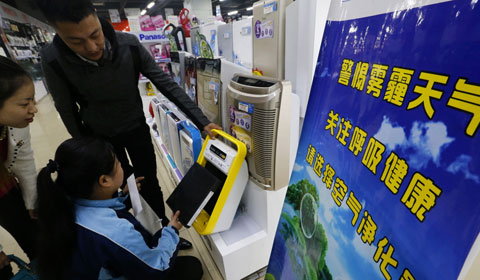
 Ministry to begin inspecting most heavily polluted regions
Ministry to begin inspecting most heavily polluted regions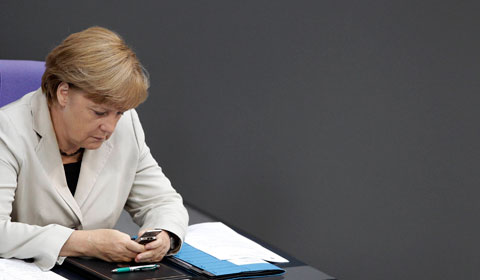
 Spy claims stir rebuke to Obama
Spy claims stir rebuke to Obama
 Paint the world a picture
Paint the world a picture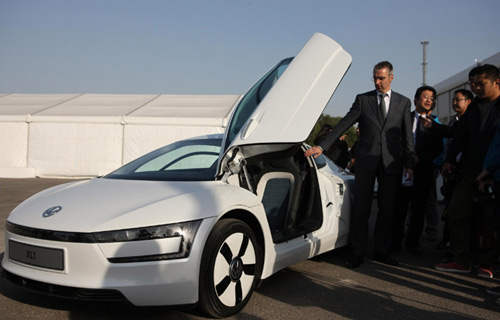
 World's first 1-liter car debuts in Beijing
World's first 1-liter car debuts in Beijing
 Latin American clown convention
Latin American clown convention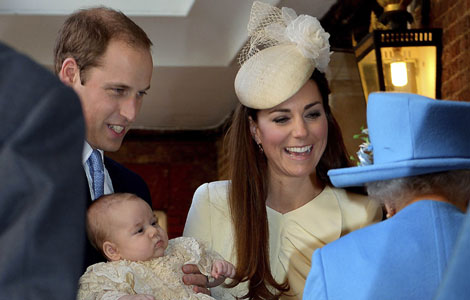
 Prince George baptized in London
Prince George baptized in London
Most Viewed
Editor's Picks

|

|

|

|

|

|
Today's Top News
US will stage foreign investment summit
Chinatown restaurants learn how to get an 'A'
Snuff bottle 'gems' on display at Met
Beijing airport set to become world's busiest
US firms urge easier process for investment
China calls for strengthened EU ties
Spy claims stir rebuke to Obama
Traders in Yiwu cashing in on e-commerce shops
US Weekly

|

|
